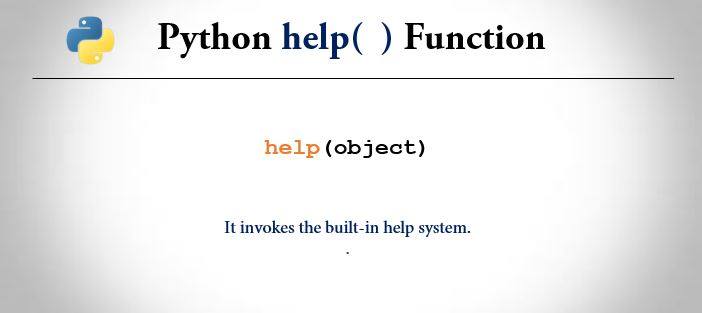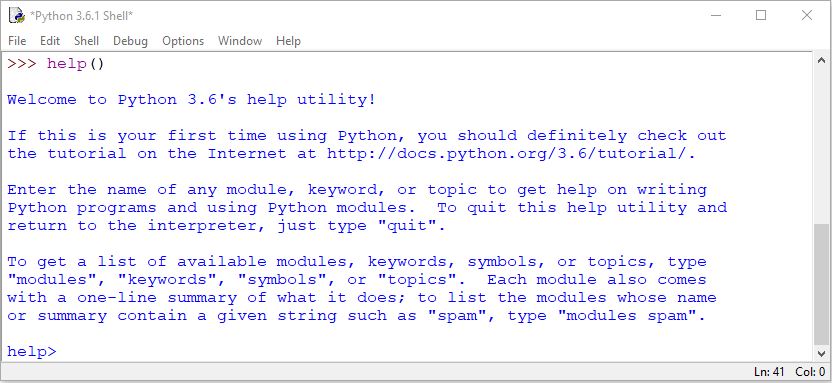Python help() is a built-in function that invokes the built-in help system. It returns all the help related to any module, function or the object supplied as the argument in the function.

Python help() Syntax
help(object)Python help() function takes one argument.
- object (optional) – name of the object for which the help is to be generated.
If the argument is not supplied, the interactive help system starts on the interpreter console.
The argument can either be a string or a non-string object.
- If the argument is a string, then the string is looked up as the name of a module, function, class, method, keyword, or documentation topic, and a help page is printed on the console.
- If the argument is any other object then a string, a help page on the corresponding object is generated.
How does help() work in Python?
Python help() function shows inbuilt help utility in the console if no argument is supplied.
Here is the example.

Now you can enter any keyword and the python shell will display all the help commands and function associated with that keyword.
help > set
Help on class set in module builtins:
class set(object)
| set() -> new empty set object
| set(iterable) -> new set object
|
| Build an unordered collection of unique elements.
|
| Methods defined here:
|
| __and__(self, value, /)
| Return self&value.
|
| __contains__(...)
| x.__contains__(y) <==> y in x.
|
| __eq__(self, value, /)
| Return self==value.
|
| __ge__(self, value, /)
| Return self>=value.
|
| __getattribute__(self, name, /)
| Return getattr(self, name).
|
| __gt__(self, value, /)
| Return self>value.
|
| __iand__(self, value, /)
| Return self&=value.
|
| __init__(self, /, *args, **kwargs)
| Initialize self. See help(type(self)) for accurate signature.
|
| __ior__(self, value, /)
| Return self|=value.
|
| __isub__(self, value, /)
| Return self-=value.
|
| __iter__(self, /)
| Implement iter(self).
|
| __ixor__(self, value, /)
| Return self^=value.
|
| __le__(self, value, /)
| Return self<=value.
|
| __len__(self, /)
| Return len(self).
|
| __lt__(self, value, /)
| Return self<value.
|
| __ne__(self, value, /)
| Return self!=value.
|
| __new__(*args, **kwargs) from builtins.type
| Create and return a new object. See help(type) for accurate signature.
|
| __or__(self, value, /)
| Return self|value.
|
| __rand__(self, value, /)
| Return value&self.
|
| __reduce__(...)
| Return state information for pickling.
|
| __repr__(self, /)
| Return repr(self).
|
| __ror__(self, value, /)
| Return value|self.
|
| __rsub__(self, value, /)
| Return value-self.
|
| __rxor__(self, value, /)
| Return value^self.
|
| __sizeof__(...)
| S.__sizeof__() -> size of S in memory, in bytes
|
| __sub__(self, value, /)
| Return self-value.
|
| __xor__(self, value, /)
| Return self^value.
|
| add(...)
| Add an element to a set.
|
| This has no effect if the element is already present.
|
| clear(...)
| Remove all elements from this set.
|
| copy(...)
| Return a shallow copy of a set.
|
| difference(...)
| Return the difference of two or more sets as a new set.
|
| (i.e. all elements that are in this set but not the others.)
|
| difference_update(...)
| Remove all elements of another set from this set.
|
| discard(...)
| Remove an element from a set if it is a member.
|
| If the element is not a member, do nothing.
|
| intersection(...)
| Return the intersection of two sets as a new set.
|
| (i.e. all elements that are in both sets.)
|
| intersection_update(...)
| Update a set with the intersection of itself and another.
|
| isdisjoint(...)
| Return True if two sets have a null intersection.
|
| issubset(...)
| Report whether another set contains this set.
|
| issuperset(...)
| Report whether this set contains another set.
|
| pop(...)
| Remove and return an arbitrary set element.
| Raises KeyError if the set is empty.
|
| remove(...)
| Remove an element from a set; it must be a member.
|
| If the element is not a member, raise a KeyError.
|
| symmetric_difference(...)
| Return the symmetric difference of two sets as a new set.
|
| (i.e. all elements that are in exactly one of the sets.)
|
| symmetric_difference_update(...)
| Update a set with the symmetric difference of itself and another.
|
| union(...)
| Return the union of sets as a new set.
|
| (i.e. all elements that are in either set.)
|
| update(...)
| Update a set with the union of itself and others.
|
| ----------------------------------------------------------------------
| Data and other attributes defined here:
|
| __hash__ = None
This help utility can be closed by simply typing following commands.
help > quitThis is all for help utility opened in the console when you run help() function without any arguments. You can also see documentation and all the help associated with a keyword by passing that keyword as an argument to help function.
Python help() Example – With Arguments
Argument can be passed to Python help() function as a string or a non-string. In both cases, the name of a modules, functions, classes, methods, documentation, and the help page is printed.
Here is an example.
>>> help(dict)
Help on class dict in module builtins:
class dict(object)
| dict() -> new empty dictionary
| dict(mapping) -> new dictionary initialized from a mapping object's
| (key, value) pairs
| dict(iterable) -> new dictionary initialized as if via:
| d = {}
| for k, v in iterable:
| d[k] = v
| dict(**kwargs) -> new dictionary initialized with the name=value pairs
| in the keyword argument list. For example: dict(one=1, two=2)
|
| Methods defined here:
|
| __contains__(self, key, /)
| True if D has a key k, else False.
|
| __delitem__(self, key, /)
| Delete self[key].
|
| __eq__(self, value, /)
| Return self==value.
|
| __ge__(self, value, /)
| Return self>=value.
|
| __getattribute__(self, name, /)
| Return getattr(self, name).
|
| __getitem__(...)
| x.__getitem__(y) <==> x[y]
|
| __gt__(self, value, /)
| Return self>value.
|
| __init__(self, /, *args, **kwargs)
| Initialize self. See help(type(self)) for accurate signature.
|
| __iter__(self, /)
| Implement iter(self).
|
| __le__(self, value, /)
| Return self<=value.
|
| __len__(self, /)
| Return len(self).
|
| __lt__(self, value, /)
| Return self<value.
|
| __ne__(self, value, /)
| Return self!=value.
|
| __new__(*args, **kwargs) from builtins.type
| Create and return a new object. See help(type) for accurate signature.
|
| __repr__(self, /)
| Return repr(self).
|
| __setitem__(self, key, value, /)
| Set self[key] to value.
|
| __sizeof__(...)
| D.__sizeof__() -> size of D in memory, in bytes
|
| clear(...)
| D.clear() -> None. Remove all items from D.
|
| copy(...)
| D.copy() -> a shallow copy of D
|
| fromkeys(iterable, value=None, /) from builtins.type
| Returns a new dict with keys from iterable and values equal to value.
|
| get(...)
| D.get(k[,d]) -> D[k] if k in D, else d. d defaults to None.
|
| items(...)
| D.items() -> a set-like object providing a view on D's items
|
| keys(...)
| D.keys() -> a set-like object providing a view on D's keys
|
| pop(...)
| D.pop(k[,d]) -> v, remove specified key and return the corresponding value.
| If key is not found, d is returned if given, otherwise KeyError is raised
|
| popitem(...)
| D.popitem() -> (k, v), remove and return some (key, value) pair as a
| 2-tuple; but raise KeyError if D is empty.
|
| setdefault(...)
| D.setdefault(k[,d]) -> D.get(k,d), also set D[k]=d if k not in D
|
| update(...)
| D.update([E, ]**F) -> None. Update D from dict/iterable E and F.
| If E is present and has a .keys() method, then does: for k in E: D[k] = E[k]
| If E is present and lacks a .keys() method, then does: for k, v in E: D[k] = v
| In either case, this is followed by: for k in F: D[k] = F[k]
|
| values(...)
| D.values() -> an object providing a view on D's values
|
| ----------------------------------------------------------------------
| Data and other attributes defined here:
|
| __hash__ = None